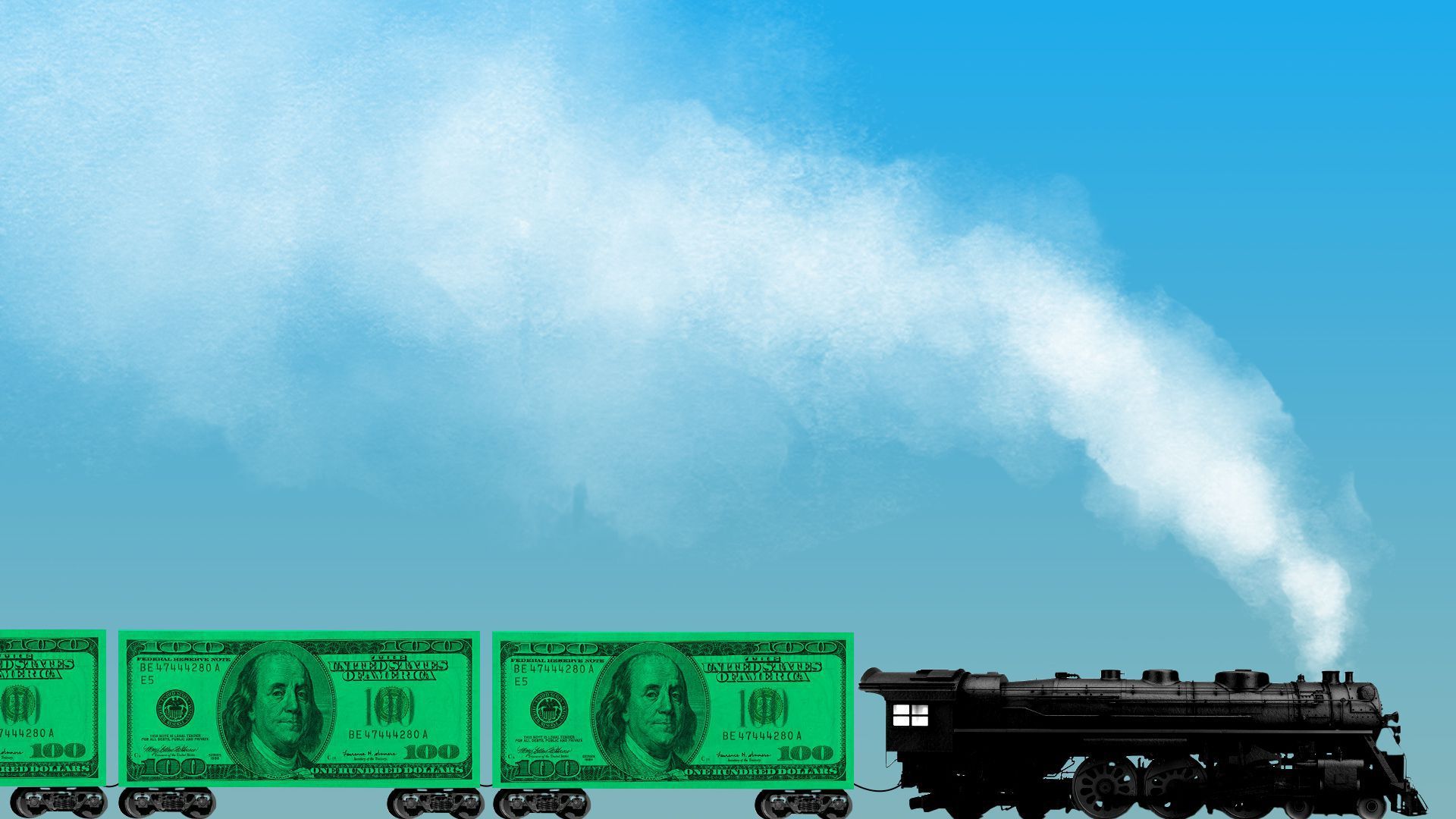| | | | | | | Presented By Aon | | | | Axios Markets | | By Matt Phillips and Emily Peck · Oct 28, 2022 | | There's a distinctly dot-com-ish feel at the moment, as even tech companies that once seemed untouchable are taking massive tumbles in the stock market. Not Twitter, though. Shareholders are set to pocket their $54.20 per share — and Elon Musk is the proud new owner. Let's dig in. Today's newsletter is 930 words, 3.5 minutes. | | | | | | 1 big thing: 🌝 Moon shot boom goes bust |  | | | Illustration: Annelise Capossela/Axios | | | | As the leaders of Ford Motor and Meta are finding out, high-interest rates have changed the capitalist calculus for big bets on money-losing projects, Matt writes. Why it matters: Low rates make speculative, long-shot bets far more attractive. High rates kill investors' tolerance for such investments. What's happening: Shares of social networking giant Meta crashed yesterday in part because its floundering virtual reality environment lost nearly $4 billion, with the red ink still to grow "significantly." - The stock suffered its second-worst single-day drop on record, collapsing by nearly 25%.
- Separately, Ford — which posted a loss Wednesday — saw its shares go up after shuttering Argo AI, the autonomous driving startup that it had invested billions.
Flashback: This is a big shift from pandemic-era investor sentiment. - From March 2020 until early this year, shares of highly speculative tech companies — which often lost gobs of money — were the hottest stocks to own.
- The tech-heavy Nasdaq composite consistently outperformed the S&P 500 over that period.
- Investments that specialized in emerging, unprofitable technologies — such as Cathie Wood's Ark Innovation ETF — became market darlings.
How it works: As we've written a bunch, interest rates — basically, yields on government bonds — exert a gravitational pull on stock prices. - That's because these yields are key inputs into the models that virtually everyone in the world of investing uses, at least to some extent, to estimate the right price for assets like stocks.
- Investors decide what to pay for stocks in part based on what they think companies can expect to make in future profits.
- They then develop a "present value" for the investment — essentially what they're willing to pay today to lay claim to those profits — using interest rates.
- Low rates make those future profits more valuable, meaning you'll pay a higher price for them today.
That's something we saw a lot over the last couple of years of market lunacy, as people poured money into SPACs, crypto, NFTs, money-losing meme stocks, nonexistent electric vehicle technology, multibillion-dollar valuations on venture-funded unicorns ... we could go on. - Since investors were rewarding such speculative ventures with soaring stock prices, stable, slightly boring companies like Meta and Ford tried to get into the act — emphasizing the speculative technology bets they too were making.
The bottom line: High-interest rates have changed the rules of the game. Ford seems to have gotten the memo, and the market is rewarding it for suddenly shuttering its AI unit. |     | | | | | | 2. Catch up quick | | 🚗 The SEC and DOJ are both investigating whether Tesla misled the public about how its autopilot system performed. (WSJ) 🛢 Chevron posts $11.2 billion in quarterly profits, nearly doubling its year-earlier tally. (CNBC) ✨ Corporate boards are getting younger as boomers retire. (Bloomberg) |     | | | | | | 3. 🙈 Meta has destroyed $800 billion in wealth |  Data: FactSet; Chart: Axios Visuals Current situation: Meta's 75% collapse since its September 2021 peak has destroyed more than $800 billion in stock market wealth. |     | | | | | | A message from Aon | | COVID-19 proved to executives that risks are interconnected | | |  | | | | 61% of business leaders who reported feeling prepared for an economic downturn in Aon's Executive Survey also agreed that risk is interconnected and that the best companies can handle risk regardless of where it comes from. Explore the full results. | | | | | | 4. 😭 ...and then came Amazon |  Data: FactSet; Chart: Axios Visuals Amazon shares collapsed after it, too, posted disappointing results — and a Q4 warning — at the close of trading yesterday, Matt writes. Driving the news: The web services and online retailing giant beat expectations for profits, but was a little bit light on top-line revenues, missing expectations from Wall Street analysts. Yes, but: The market reaction was brutal, sending shares down by more than 20% after the release of the numbers around 4pm ET. - Amazon Web Services — the server business and the company's profit engine — disappointed investors, bringing in $20.5 billion in revenue compared to Wall Street expectations of $21.1 billion, CNBC reported.
- The market also seemed concerned with the guidance the company offered for the all-important Q4 holiday shopping season — it said sales would grow between 2% and 8%. (Last year, fourth-quarter sales grew 9%.)
But, but, but: Apple did OK at least. |     | | |  | | | | If you like this newsletter, your friends may, too! Refer your friends and get free Axios swag when they sign up. | | | | | | | | 5. Businesses are getting worried about a rail strike |  | | | Illustration: Aïda Amer/Axios | | | | In a letter yesterday, more than 300 trade organizations, increasingly anxious about the possibility of a rail worker strike, urged the White House to push harder to avert that economic disaster, Emily writes. - What they're saying: "We can't overstate how vital it is for retail supply chains, consumers, and the economy — particularly ahead of the holiday shopping season — to avoid a strike here," Caroline Niery, a communications director at the Retail Industry Leader Association, one of the signatories, tells Axios.
Between the lines: The White House busted its tail to get a deal brokered at the 11th hour between the nation's freight rail companies and their unions. - But the rank and file members — the workers on the ground — need to ratify that deal, and the process isn't going well.
- This week the Brotherhood of Railroad Signalmen (BRS) declined to ratify the Biden-brokered contract, making it the second of 12 unions to vote no.
The impact: If more unions follow suit, a strike could happen, the letter warns. - It was signed by the Chamber of Commerce and an alphabet soup of business trade groups, including folks who represent farmers, manufacturers, meat importers, truckers, the beer industry, chemical makers and more.
- "Because the White House played such a central role in the process, we believe it can be helpful in continuing to move the process forward in a positive direction," they write.
- "Otherwise, Congress will be called upon to act."
The other side: "The administration is in contact with the parties, as we always are," White House spokesperson Robyn Patterson told Axios. - "We stand ready to help, but we also remain clear that a shutdown is completely unacceptable."
|     | | | | | | A message from Aon | | Aon survey: prepared executives are resisting urge to slow hiring | | |  | | | | Aon's recent survey found that business leaders who feel prepared for a potential recession are resisting the urge to slow hiring. 42% of very prepared leaders are focused on attracting and retaining top executive talent. Read the full results. | | | | Today's newsletter was edited by Kate Marino and copy edited by Mickey Meece. |  | | Why stop here? Let's go Pro. | | | | | | Axios thanks our partners for supporting our newsletters. If you're interested in advertising, learn more here.
Sponsorship has no influence on editorial content. Axios, 3100 Clarendon Blvd, Arlington VA 22201 | | | You received this email because you signed up for newsletters from Axios.
Change your preferences or unsubscribe here. | | | Was this email forwarded to you?
Sign up now to get Axios in your inbox. | | | | Follow Axios on social media:    | | | | | |












No comments:
Post a Comment